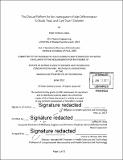The Disque Platform for the investigation of islet differentiation to study, treat, and cure Type 1 Diabetes
Author(s)
Jones, Peter Anthony S.M. Massachusetts Institute of Technology
DownloadFull printable version (5.551Mb)
Other Contributors
Harvard--MIT Program in Health Sciences and Technology.
Advisor
Jeffrey M. Karp.
Terms of use
Metadata
Show full item recordAbstract
There is a critical health care need to generate large numbers of beta cells for transplantation. In Type 1 Diabetes (T1D), insulin-producing beta cells in the islets of Langerhans within the pancreas, which support glucose homeostasis, are destroyed in an autoimmune attack. The ensuing loss of glycemic control leads to serious complications, requiring life-long insulin injections and close monitoring, while shortening lifespan by 11-13 years. In the face of a three percent annual increase in T1D incidence, there is a grave lack of transplantable material, and very few patients are able to receive an islet transplant each year. Recent advances in stem cell differentiation have enabled the production of large quantities of insulin-producing beta-like cells in vitro, bringing hope to the field. However, the efficiency and yield of such production methods remains unacceptably low, with high batch-to-batch variability, and the function of these cells is unstable. Moreover, the ability to probe the conditions that affect differentiation outcomes is limited by the scale, cost, and complexity of existing culture systems. The present work focuses on the Disque Platform, a biomimetic screening platform for the investigation of islet cell differentiation. The Disque Platform allows for the formation of differentiating 3D micro-tissues within an automation-friendly design, and is capable of systematically manipulating the developing stem cell niche in order to identify chemical and physical cues that enhance beta cell production. Significantly, the Disque Platform consistently differentiates beta-like cells from pancreatic progenitor cells, with similar efficacy to existing high-volume production methods. Furthermore, it achieves superior differentiation outcomes compared to the 2D culture systems tested, and is able to respond to interventions when conventional systems cannot produce a clear signal or readout. Together, these data support the ability of the Disque Platform to investigate specific interventions to enhance beta-cell differentiation. It is hoped that the Disque Platform can serve as a springboard for beta cell and islet study within the diabetes community, and that these advances can contribute towards a cure for Type 1 Diabetes.
Description
Thesis: S.M. in the Concentration of Mechanical Engineering, Harvard-MIT Program in Health Sciences and Technology, 2017. Cataloged from PDF version of thesis. Includes bibliographical references (pages 28-31).
Date issued
2017Department
Harvard University--MIT Division of Health Sciences and TechnologyPublisher
Massachusetts Institute of Technology
Keywords
Harvard--MIT Program in Health Sciences and Technology.